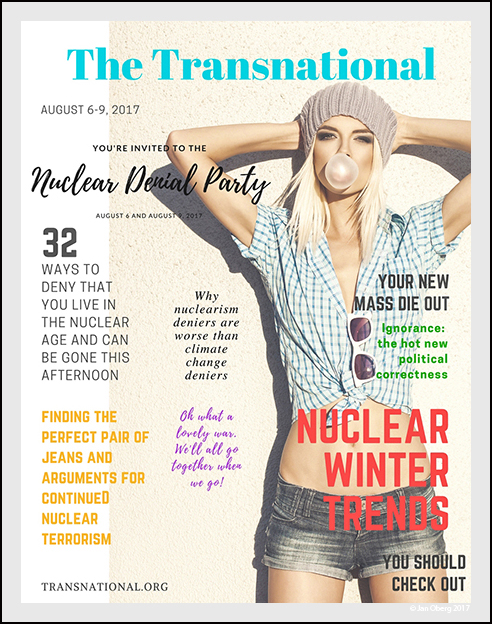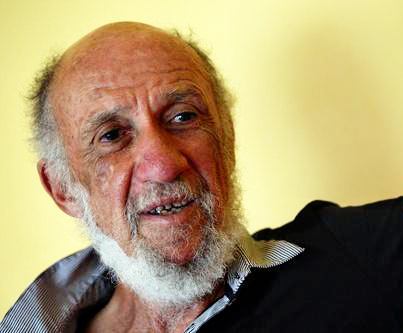Posts Tagged ‘nuclearism’
Trump as war criminal?
By Jonathan Power
September 26th 2017
Out of the blue the war in Vietnam is in the news. Yet it is not the fiftieth anniversary of America’s defeat in Vietnam when North Vietnam caused it to flee. It’s only the forty second.
Part of this must be fearful parallels with the moral and strategic blindness of President Donald Trump who seems to believe in uttering his life and death rhetoric, akin to President Richard Nixon’s on Vietnam, he can frighten the enemy into submission – in his case North Korea.
Many people are worried that Trump is ready to fight America’s biggest war since Vietnam. As did Henry Kissinger, Nixon’s National Security Advisor, he appears to be considering the use of nuclear weapons.
The second reason for Vietnam-consciousness are the rave reviews that are being given to Ken Burns and Lynn Novick’s 10 part documentary on the Vietnam War.
It is being mentioned all over the place.
To my mind one of the big questions is, is Trump ready to be branded a war criminal by present and future generations? Read the rest of this entry »
TFF PressInfo # 422: You’re invited to the Nuclear Denial Party!
By Jan Oberg
Lund, Sweden – Hiroshima Day, August 6, 2017
Welcome to the Nuclear Denial Party!!
Since marketing, omitted and fake news have – to a worrying extent – replaced knowledge and ethics, why not celebrate that the media have omitted every mention of Hiroshima Day today?
Why not celebrate that all the responsible NATO countries and all other (less responsible) nuclear powers refuse to work for a nuclear ban and abolition as well as for general and complete disarmament?
Why not celebrate the decade-long self-deception that we can stop nuclear proliferation while being silent about nuclear possession?
Why not recognise with joy that there is an evil terrorism such as ISIS that we must fight and a good terrorism called ‘nuclear balance of terror’ that we must embrace – and that killing a few in the Middle East is much worse than planning to kill millions upon millions of innocent civilians worldwide and for a surely noble cause?
Why not laud the politico-media trick that the world’s attention is on non-nuclear Iran and not on nuclear Israel?
Why not appreciate the moral victory that we have – as civilisation – made slavery illegal, abolished absolute monarchy and put cannibalism behind us but – thank God! – haven’t given up the ultimate, death-and-destruction Omnicide weapons?
Why not feel good that Trump, Putin, Jinping, Macron, May etc. all play God and take the best care of the rest of us by deciding whether or not to continue project Humanity? They are all reliable, rational and moral leaders, so why not just be happy that we don’t have to worry!
Why not be grateful that there have been no more drunk commanders in nuclear facilities, panicking leaders, false nuclear warnings, technical failures, deficient floppy disk computers and no more nukes dropped inadvertently than we have heard of?
And why not, finally, see how fortunate it is that no referendum has ever been held by citizens in nuclear states. I mean, if the people had been allowed to say ‘No!’ we had hardly been so safe as we are today and instead had wasted trillions of dollars on making the world a better place for us all.
So, at the end of the day why should we not celebrate that – in spite of all this stupidity, immorality and nuclear dictatorship – 72 years into the Nuclear Age you and I are still alive?
TFF PressInfo # 370: If Obama visits Hiroshima (Part 1)
By Richard Falk
There are mounting hopes that Barack Obama will use the occasion of the Group of 7 meeting in Japan next month to visit Hiroshima, and become the first American president to do so.
It is remarkable that it required a wait of over 60 years until John Kerry became the first high American official to make such a visit, which he termed ‘gut-wrenching,’ while at the same time purposely refraining from offering any kind of apology to the Japanese people for one of the worse acts of state terror against a defenseless population in all of human history.
Let’s hope that Obama goes, and displays more remorse than Kerry who at least deserves some credit for paving the way.
The contrast between the many pilgrimages of homage by Western leaders, including those of Germany, to Auschwitz and other notorious death camps, and the absence of comparable pilgrimages to Hiroshima and Nagasaki underscores the difference between winning and losing a major war. This contrast cannot be properly accounted for by insisting on a hierarchy of evils that the Holocaust dominates.
The United States, in particular, has a more generalized aversion to revisiting its darker hours, although recent events have illuminated some of the shadows cast by the racist legacies of slavery.
The decimation of native Americans has yet to be properly addressed at official levels, and recent reports of soaring suicide rates suggests that the native American narrative continues to unfold tragically.
The New York Times in an unsigned editorial on April 12 urged President Obama to make this symbolic visit to Hiroshima, and in their words “to make it count” by doing more than making a ritual appearance. Recalling accurately that Obama “won the Nobel Peace Prize in 2009 largely because of his nuclear agenda” the editorial persuasively criticized Obama for failing to follow through on his Prague vision of working toward a world free of nuclear weapons.
A visit to Hiroshima is, in effect, a second chance, perhaps a last chance, to satisfy the expectation created early in his presidency.
When it came to specifics as to what Obama might do the Times offered a typical arms control set of recommendations of what it called “small but doable advances”: canceling the new air-launched, nuclear-armed cruise missile and ensuring greater compliance with the prohibition on nuclear testing by its endorsement coupled with a recommendation that future compliance be monitored by the UN Security Council.
The Times leaves readers with the widely shared false impression that such measures can be considered incremental steps that will lead the world over time to a nuclear-free world. Such a view is unconvincing, and diversionary.
In opposition, I believe these moves serve to stabilize the nuclear status quo have a negative effect on disarmament prospects. By making existing realities somewhat less prone to accidents and irresponsibly provocative weapons innovations, the posture of living with nuclear weapons gains credibility and the arguments for nuclear disarmament are weakened even to the extent of being irrelevant.
I believe that it is a dangerous fallacy to suppose that arms control measures, even if beneficial in themselves, can be thought of as moving the world closer to nuclear disarmament.
Instead, what such measures do, and have been doing for decades, is to reinforce nuclear complacency by making nuclear disarmament either seem unnecessary or utopian, and to some extent even undesirably destabilizing. In other words, contrary to conventional wisdom, moving down the arms control path is a sure way to make certain that disarmament will never occur!
As mentioned, many arms control moves are inherently worthwhile. It is only natural to favor initiatives that cancel the development of provocative weapons systems, disallow weapons testing, and cut costs. Without such measures there would occur a dangerous erosion of the de facto taboo that has prevented (so far) any use of nuclear weaponry since 1945.
At the same time it is vital to understand that the taboo and the arms control regime of managing the nuclear weapons environment does not lead to the realization of disarmament and the vision of a world without nuclear weapons.
Let me put it this way, if arms control is affirmed for its own sake or as the best way to put the world on a path of incremental steps that will lead over time to disarmament, then such an approach is nurturing the false consciousness that has unfortunately prevailed in public discourse ever since the Nonproliferation Treaty came into force in 1970.
The point can be express in more folksy language: we have been acting for decades as if the horse of disarmament is being pulled by the cart of arms control. In fact, it is the horse of disarmament that should be pulling the cart of arms control, which would make arms control measures welcome as place holders while the primary quest for nuclear disarmament was being toward implementation.
There is no reason to delay putting the horse in front of the cart, and Obama’s failure to do so at Prague was the central flaw of his otherwise justly applauded speech.
Where Obama went off the tracks in my view was when he consigned nuclear disarmament to the remote future, and proposed in the interim reliance on the deterrent capability of the nuclear weapons arsenal and this alleged forward momentum of incremental arms control steps.
What is worse, Obama uncritically endorsed the nonproliferation treaty regime, lamenting only that it is being weakened by breakout countries, especially North Korea, and this partly explains why he felt it necessary back in 2009 to consider nuclear disarmament as a practical alternative to a continued reliance on nonproliferation, although posited disarmament more as a goal beyond reach and not as a serious present political option.
He expressed this futuristic outlook in these words: “I am not naïve. This goal will not be reached quickly – perhaps not in my lifetime.” He never clarifies why such a goal is not attainable within the term of his presidency, or at least its explicit pursuit.
In this regard, and with respect to Obama’s legacy, the visit to Hiroshima provides an overdue opportunity to disentangle nuclear disarmament from arms control.



